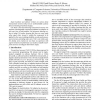Free Online Productivity Tools
i2Speak
i2Symbol
i2OCR
iTex2Img
iWeb2Print
iWeb2Shot
i2Type
iPdf2Split
iPdf2Merge
i2Bopomofo
i2Arabic
i2Style
i2Image
i2PDF
iLatex2Rtf
Sci2ools
125
click to vote
DAGSTUHL
2007
2007
A Case for Deconstructing Hardware Transactional Memory Systems
Major hardware and software vendors are curious about transactional memory (TM), but are understandably cautious about committing to hardware changes. Our thesis is that deconstructing transactional memory into separate, interchangeable components facilitates TM adoption in two ways. First, it aids hardware TM refinement, allowing vendors to adopt TM earlier, knowing that they can more easily refine aspects later. Second, it enables the components to be applied to other uses, including reliability, security, performance, and correctness, providing value even if TM is not widely used. We develop some evidence for our thesis via experience with LogTM variants and preliminary case studies of scalable watchpoints and race recording for deterministic replay.
DAGSTUHL 2007 | Facilitates Tm Adoption | Hardware Tm Refinement | Software Engineering | Transactional Memory |
Related Content
| Added | 29 Oct 2010 |
| Updated | 29 Oct 2010 |
| Type | Conference |
| Year | 2007 |
| Where | DAGSTUHL |
| Authors | Mark D. Hill, Derek Hower, Kevin E. Moore, Michael M. Swift, Haris Volos, David A. Wood |
Comments (0)

